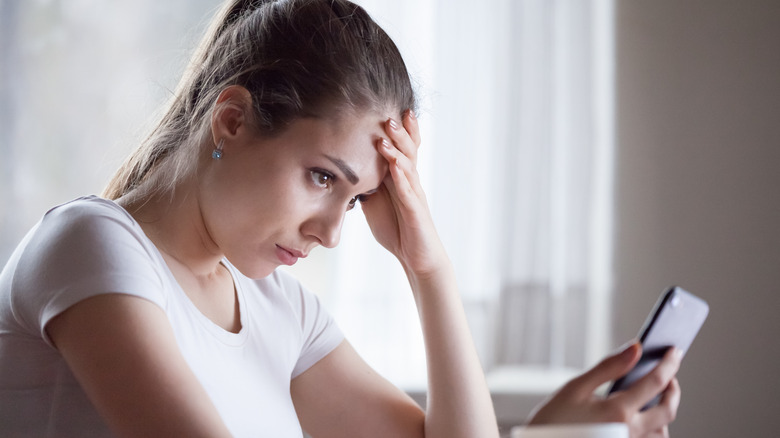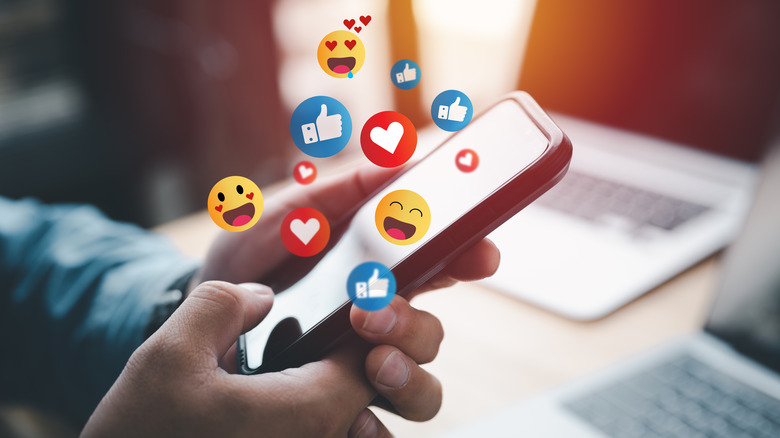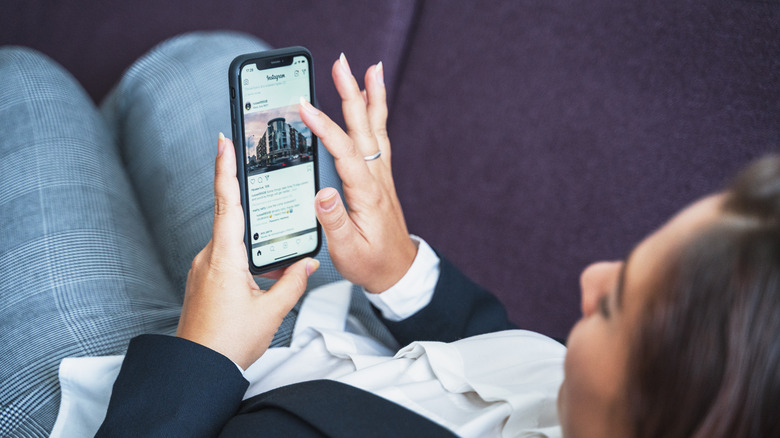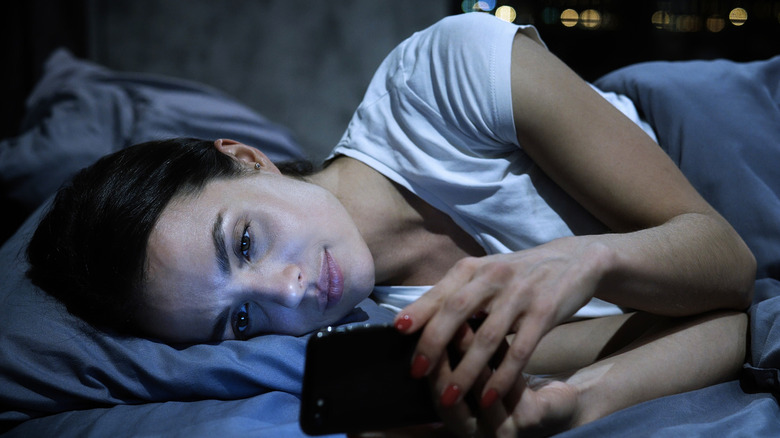This Is Why Social Media Makes You Sad
Having only been introduced to the public in 1997, social media has rapidly become a common thread in the majority of people's lives (via Wonderopolis). According to Healthline, around 77 percent of people in the United States have at least one social media account. While, at first glance, it may seem fun and harmless to share beautifully filtered photos of your avocado toast or a just-barely photoshopped selfie following a great haircut, it could be doing more damage than you think.
Since social media usage has only gained major popularity over the last few decades, the long-term effects on mental health, interpersonal relationships, and general behaviors aren't definitively known. While there is still a lot we don't know about the long-term effects of social media, what we do know is frightening.
According to a study cited by NCBI, "depression is one of the unintended significances of unnecessary use of social media." According to the site, social media users observed in the study experienced an average of a 70% increase in depressive symptoms. While this doesn't necessarily mean that you need to cut out social media completely, it does mean that you should proceed with caution. In order to do so, it helps to understand why social media usage is linked to feeling sad.
Studies show two common issues
In a study published in the Journal of Social and Clinical Psychology, Jordyn Young, a psychology student at the University of Pennsylvania noted the correlation between depression and social media in her findings. "What we found overall is that if you use less social media, you are actually less depressed and less lonely, meaning that the decreased social media use is what causes that qualitative shift in your well-being," she says of the study. While gathering research, a large group of students at the university was split in half between those who continued with their usual social media habits and those who were given very limited access to their platforms of choice, (via Healthline). In the end, those with limited access to social media experienced fewer self-reported symptoms of depression.
This study and others like it have led to this existence of multiple theories as to why social media users experience higher levels of depression. The two theories that seem to hold the most weight are feelings of comparison and "FOMO," aka the fear of missing out.
Comparing isn't healthy
Accoring to Oscar Ybarra, PhD, has been trying to figure out why social media makes people sad, and he has a pretty good idea of what it is. "What happens many times when they log on is that you kind of activate a lot of social comparison. People don't necessarily have to be super aware that this is occurring, but it does. You log on, you're generally dealing with very curated content on the other side," Ybarra says of the phenomenon (via Healthline).
This is especially true if you find yourself scrolling through a feed filled with ultra-curated influencers and those who have curated a particularly idyllic online presence. This leaving users wondering, "How is my life stacking up?" The affects of this can increase depending on how often you scroll and how many jealousy inducing photos you're seeing each day. Social media users also often fall into a pattern "doom scrolling," which is sparked by a need to take in all available information. This can lead to feeling overloaded and without control (via Insider). With a bit of extra curation of your "following" list and time-monitoring, you may be able to avoid this entirely by only following accounts that bring you joy rather than spark a comparison.
FOMO may be affecting your mental health
Amy Summervile, PhD and "expert" on the psychology of regret, explains that social media usage can lead to the fear of missing out. She says, "the FOMO experience specifically is this feeling that I personally could have been there and I wasn't. I do think that part of the reason that's really powerful is this cue that maybe we're not being included by people we have important social relationships with" (via Healthline). This is to say that, when you can constantly see what your social circle is up to even when you're not around, you may end up feeling excluded. FOMO can occur even if you're the one who decided to exclude yourself from the plans you're viewing.
Neither Summerville nor Oscar Ybarra believe that there is enough research to back up these claims and put real guidelines in place for social media, but both note the importance of understanding it's effects. They're not alone. Gail Saltz, MD, an associate professor of psychiatry at the New York Presbyterian Hospital Weill-Cornell School of Medicine says of social media-induced FOMO, "It creates the feeling that you are on the outside looking in, can't participate, can't measure up, and would embarrass yourself if you tried" (via Insider).
Social media may be affecting you in surprising ways
In addition to constant comparisons and the fear of missing out, Medical New Today cites a few other reasons why social media may be so dramatically affecting levels of depression. In a 2015 survey, it was found that some teens spend nine or more hours a day using social media, which is linked to both mental and physical effects. Most obviously, the article notes that this much social media usage can cut into quality sleep time, leaving heavy social media users feeling tired and low energy throughout the day.
With the introduction of social media also came the introduction of cyberbulling, a form of bullying not previously experienced by young people. A 2020 survey showed that approximately half of teens have experienced cyber bullying. While there is no hard evidence of a correlation, it is worth noting with concern that the suicide attempts in teens have increased by about 20% since 2009.
While experts remain unsure of how bad the adverse effects of social media will be in the long run, it is clear that it's effects are often more negative than positive. If you're feeling more sad than usual, it might be worth taking a break from the endless scrolling for your mental health.
If you or anyone you know is having suicidal thoughts, please call the National Suicide Prevention Lifeline at 1-800-273-TALK (8255).
If you or someone you know is struggling with mental health, please contact the Crisis Text Line by texting HOME to 741741, call the National Alliance on Mental Illness helpline at 1-800-950-NAMI (6264), or visit the National Institute of Mental Health website.




